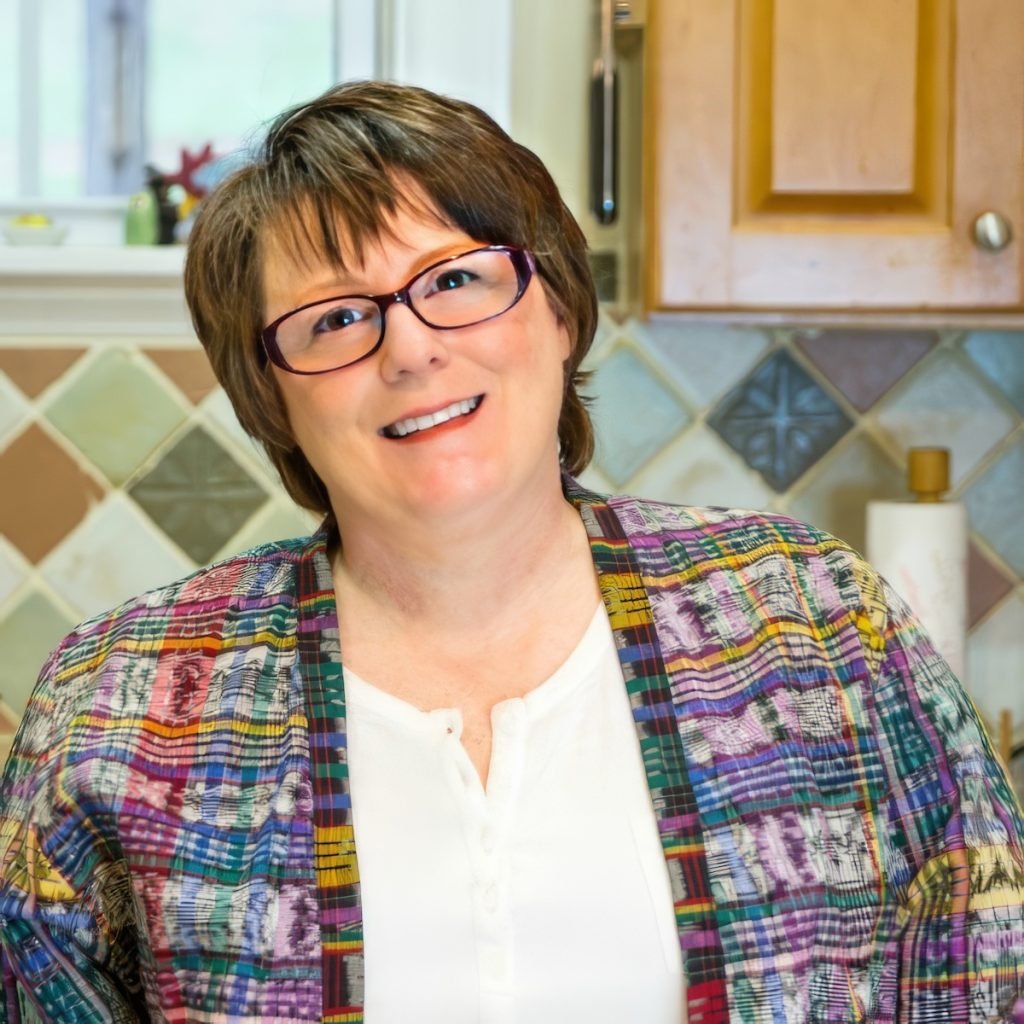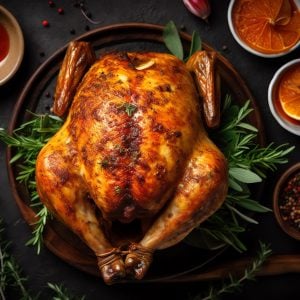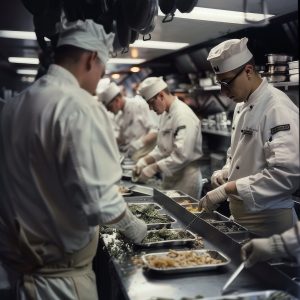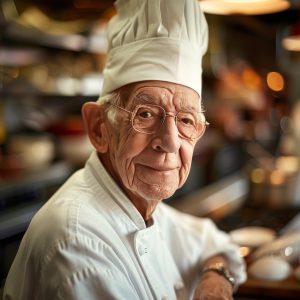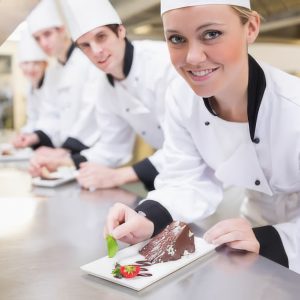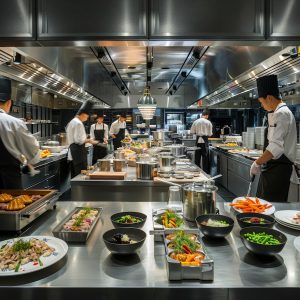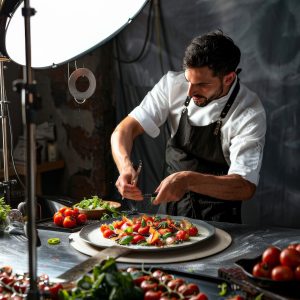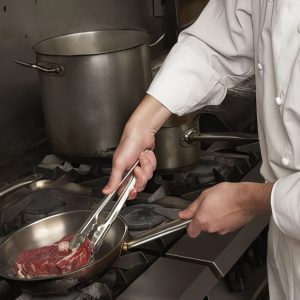Interview with Pastry Chef Extraordinaire Jenni Field
“It is supremely gratifying to hear, “That was the best meal I’ve ever eaten!..”– Jennifer Field
Jenni first contacted me to tell me she was a fan of my site and if I would look at her brand-new site, Pastry Chef Online. She
From there, we started an email dialogue about food, and I convinced her to participate in my Novice to Pro Interview. Jenni has also been gracious enough to help me answer some of the cooking questions you all send me.
As you will see from the interview, Chef Jennifer started her professional culinary career later in life as it turns out many people are doing these days. She offered some great advice to someone who was thinking of starting culinary school, aged 40+, that you can read at Too Old For Culinary School.
A graduate from the Orlando Culinary Academy, Le Cordon Bleu Culinary Arts School, Jenni has insightful information for anyone thinking of attending culinary school. Since graduation, she has worked as a pastry chef at several establishments and is currently helping open a new restaurant in Winter Park, Florida, called The Ravenous Pig—An American Gastropub.
Here’s my interview with Chef Jennifer Field:
Chef, When did you realize you wanted to be a professional chef?
Not until fairly recently. I had always been a passionate amateur, but it wasn’t until I was looking to change careers and I sat down and evaluated what I loved doing that I realized that I could cook professionally.
Who inspired you most as a young cook & what did you learn from them?
My great-aunt has been baking for as long as I can remember. Every Christmas, she made tons of cookies, cakes, and plum puddings that she shared with family and friends, and I always thought it was so cool. I learned from her that baking was a way to show caring for others.
My mom was a self-taught cook, and I learned from her that books can be handy–if she wanted to make a new type of dessert, she researched and then went for it. My brother, who sadly died several years ago, was a wonderful intuitive cook. He seemed to know what a recipe needed without formal training.
Back when we were in our early 20’s, we would create elaborate multi-course menus and prepare them for Mothers’ Day and Fathers’ Day. He was definitely the head chef, and I was his sous chef!
You started culinary school later in life. What were you doing before starting a new career?
I was a special education teacher for many years. I used baking and cooking as a teaching tool–measurement, following directions, etc. and for some of my classes, we cooked or baked every Friday. I also used baking and cooking as a reward for good behavior. The students who earned their points (remember, it was special ed–we’re all about the charts and points in special ed!) got to bake and then eat their creations.
What/Who helped you decide to change careers?
My husband finally pushed me into changing careers and going into professional cooking. After 16 years in a profession whose burn-out rate is about 5 years, I really needed a change but have always hated giving up. My husband helped me realize I could leave teaching without feeling guilty and do something for myself.
How did you decide on Orlando Culinary Academy? (Location, reputation, cost?)
Before I began searching for a culinary school, I had no idea that Orlando even had one! Once I decided to change careers, I immediately went on the internet and searched “Culinary Schools Orlando” and up popped OCA. Le Cordon Bleu has a good reputation in the industry, and it was also conveniently located less than 30 miles from home.
Did you compare it to other schools?
I did not do a lot of comparison shopping when looking at culinary schools. We were not interested in moving, and I certainly didn’t want to live away from my husband for months and months, so, since OCA was at our back door, I went with it.
What were you looking for in a culinary arts school?
I was interested in a school with a good reputation, one that gave students access to state of the art equipment, ingredients and techniques and one that offered a strong placement program in the industry. I got all of that from OCA.
What advise would you give a high school student interested in going to culinary school?
My best advice would be to work in a kitchen before deciding to go to culinary school. While OCA will accept anyone, experience or no, the Culinary Institute of America (CIA) requires 2 years of kitchen experience before they will accept you. I think this is a sound practice.
With the rise in popularity of The Food Network and other cooking shows (Top Chef, Hell’s Kitchen, etc), many young people might romanticize what it means to work in a professional kitchen. Give it at least a few months to see if working in a kitchen will be a good fit for you.
If you already have experience and know that cooking professionally is really what you want to do, I would visit the schools you are considering and talk to instructors and students to get the “low down” on what the school is really all about. I’d also look into culinary programs available through your local community college.
Culinary school is seriously expensive, but the skills can be taught anywhere. Sautéing is sautéing, whether at the CIA or Small Town Tech.
Is that the same advise you would give an adult starting a second career?
If not, what would be different? After attending culinary school as an adult, I would advise other adults about the same. Make sure you want it; see if you can get training in a less-expensive arena, and talk to the people at the schools you are considering.
I feel that going to school and getting my diploma helped legitimize my career change but didn’t really teach me much. Experience is a great teacher; you might have enough experience to walk into a kitchen and get a job, show them what you can do, and then quickly move up to positions of greater responsibility.
For better or worse, you’re competing in the workplace with folks who might not be able to drink legally yet. Your work ethic and maturity will go a long way to getting you noticed.
How were you trained and what was the experience like? Hours, instructors, classmates, workload, etc.
I attended school 25 hours a week. Most classes lasted 3 weeks. Aside from Safety and Sanitation, Marketing, Cost Control and Wines, most classes were taught in working kitchens. (Students right out of high school or those without a previous degree also had to take math, computer, and English classes).
I would say that about 85% of the time, we were actually cooking or making something in those classes. The chef would lecture for a little while on whatever the topic was (leaveners, types of flour, etc), and then we’d get into cooking and baking.
Often we worked in small groups to prepare dishes. At the end of the three week period, we had a practical exam where we had to present products to be graded on a rubric. (Ex: cookies of uniform size? Too little/too much spread? Under/over baked/perfect?)
There was a little bit (a very little bit) of homework for the lab classes, and most of the classroom classes required one or two tests as well as a paper or project (also often small group).
During the lab classes, chefs circulated and helped when necessary. They gave constructive criticism and modeled troubleshooting for us (here are some reasons your meringue might be grainy: a), b), c)) The entire course of study lasted about a year for me, including the 300 hour pastry externship.
For students just out of high school, the program lasts about 15 months, including the externship. At the end of a successfully completed program, students earn an AS degree in Culinary Arts as well as the Diploma from Le Cordon Bleu, Paris.
Can you recall a funny culinary student story and share it with us?
One time, a student was working on making puff pastry, and they were mixing the basic dough in a stand mixer. All of a sudden, she and her partner began to laugh. We all looked over, wondering what was so funny. By this time, they could barely speak, so we walked over to see what all the fuss was about.
The student had turned on the mixer without taking the eggs out of the bowl. Whole eggs. In the shell. So what was mixing was a lumpy dough with lots and lots of bits of eggshell in it. Needless to say, they started over!
What was you first job as a professional in the restaurant industry and what was that like?
My first professional job was head (only) baker at a small start-up bakery and cafe on International Drive in Orlando. I worked from 6am until around noon. I made all their cinnamon buns, brownies, muffins, cookies, eclairs and puff pastry items (from store-bought puff pastry) such as fruit turnovers and pinwheels.
I also occasionally rang up sales or cooked someone some eggs or pressed a Cuban sandwich. It was varied experience, and in that sense it was very positive. This was an interesting job in that I learned how much it takes to open and run a restaurant.
The folks who ran this place expected to make money immediately. When they didn’t, they closed up shop and moved back to California (they were open for a grand total of 3 months)!
What are the top 3 or 4 traits someone should have to succeed as a chef?
You have to have a passion for food. Otherwise, it’s just another job, and what would be the point of getting all hot, sweaty, and burned if you didn’t love it?!
The ability to work in a fast-paced, hot environment.
Attention to detail coupled with the ability to multitask. You also have to have good communication skills, such as talking with people at other stations to ensure that the different components of an order are all ready at roughly the same time.
To be a great chef, you also have to be able to lead your kitchen staff: to correct them, to lead by example, to ensure that they’re cooking to your standards, to teach them, to motivate them. This might be the most important defining characteristic of a chef. Without leadership skills and ability and the respect of your staff, you’re really just a cook.
What is your favorite style of cooking? What about that style most appeals to you?
I prefer elevated home-style cooking. I like to take familiar ingredients and dishes and refine them or make them the “best ever” of that type of dish by taking extra steps such as straining or layering flavors.
For instance, in a chocolate bread pudding, I steep toasted hazelnuts in milk and cream overnight to infuse the flavor, strain it, and use it as the base of a chocolate custard that also contains Frangelico, to underline the hazelnut flavor. The pudding is finished with a hazelnut streusel for an additional punch of hazelnut.
What is your favorite cooking gadget?
I love my microplane and couldn’t live without it.
What 5 cookbooks would you recommend every home cook own?
Cookwise: The Secrets of Cooking Revealed, by Shirley Corriher–this is a great food science book with recipes that illustrate the scientific principles described in the book. Far from being a dry, clinical look at cooking and baking, Shirley’s tone is very engaging.
I’m Just Here for The Food, by Alton Brown. This book, too, talks about the “why” of cooking and not just the “how.” Recipes are arranged according to technique, which I find helpful.
The Cake Bible, by Rose Levy Beranbaum. Tons of brilliantly formulated recipes for cakes from simple to absolutely spectacular. Gorgeous photos, as well.
How to Think Like a Chef, by Tom Colicchio. This book really gets into the chef’s thought process: What is fresh and in season right now? What goes with it? How best to cook it to show it off?
How to Cook Without A Book, by Pam Anderson. Read this book and understand it and never use a recipe again (well, almost never). This is a very liberating book. Learn techniques, and adapt them to the ingredients on hand. I love it.
And a sixth:
The French Laundry Cookbook, by Thomas Keller. Learn from the best. Also read all the sidebars and chapter introductions. There’s tons of great information in here as well as pictures of Chef Keller’s glorious food.
What is your favorite spice to cook with and why?
Cinnamon is one of my favorite spices to cook with. Not only is cinnamon a great flavor, but the smell of cinnamon (within reason–I hate those cinnamon brooms) can bring people back to their childhoods.
It is a flavor/scent that is evocative of comfort foods–oatmeal, cinnamon buns, mom’s French toast. Cinnamon makes people close their eyes and say, “Mmmmm!” It is also equally at home in both savory and sweet applications.
What are your two or three favorite ingredients to cook with because they work so well together?
I love to put lemon, honey and tea together. I drink tons of tea at home, and it’s fun to recreate those homey flavors at work. Here’s one way to combine those ingredients: Lemon tart with a honey-tea tuile. Or maybe a honey-graham crumb crust, lemon sabayon and Earl Grey granita. I’m not sure there’s a way to make those three ingredients not get along.
What is the most underrated ingredient in your opinion and why?
On the baking and pastry side, I think salt is definitely the most underrated ingredient. Salt’s function isn’t to make things salty but to enhance flavors. So, suppose you use salt in everything you make. In that case, your vanilla pudding will taste way more vanilla-y, your brownies will be way more chocolate-y (chocolate and salt are wonderful together), and your apple sorbet will be way more apple-y.
What is your favorite fish dish?
I have to admit that I’m not a big fish fan. It’s part of the reason that I went into pastries. Really. The best fish I ever ate, and I would actually eat it again (which is high praise from me) was striped bass poached in chorizo oil. Oh, my, but it was good.
What are the top 5 cooking tips or suggestions you would give a novice cook?
- Read, read, read.
- Experiment
- Eat good food and talk to the people who made it. How did they do it? What did they use?
- Make use of all the resources available on the internet. The cooking and baking community represented online have thousands of years of combined experience, and they all want to help you become a better cook.
- Jump in and do it; don’t be intimidated by techniques or ingredients.
When cooking at home, what do you like to prepare for yourself?
I love simple risotto. I make it with arborio rice, shallot, chicken stock, saffron, olive oil, butter and lots of parmesan cheese. It is creamy and comforting.
What is your signature dish or your favorite recipe? (please share it with us if you don’t mind)
I make these for bread service at the restaurant every day. People clamor for them in a most undignified manner! This recipe doubles and quadruples with no problem (I make a batch with 32 cups of flour), so it’s a good recipe for a crowd
If you have any comments or suggestions you would like to offer my readers:
Here’s something that I’ve learned about working in a restaurant: It is really hard work. It’s long hours in a hot and potentially dangerous environment. It’s loud. There’s a lot of cursing. (Gordon Ramsey talks like almost every chef I’ve met. It’s not just for show).
You’re always under pressure to get it done quickly and brilliantly. It doesn’t always work out that way, but that’s the goal: get it done five minutes ago and get it right.
For the last few weeks, I’ve been on the opening team at a new restaurant—cleaning, ordering, and cleaning some more; writing menus; tasting food, wine, and beer; and then preparing for the opening. Wow!
That first week, we were only open Thursday, Friday and Saturday for dinner service, and I worked 72 hours. By the way, that was fewer than anyone else in the kitchen. (But I’m older than anyone else in the kitchen, so I don’t feel too bad about it)!
It takes a certain kind of person to work like that. Not everyone is cut out for it: you either love it or you hate it. I am really enjoying myself, although I’d like to get a little more rest, thank you very much.
I’m not sure that I’ll want to do this forever, but for now and for the foreseeable future, I’m quite happy with my choice to work in a professional kitchen. I have met amazingly talented people, and it is supremely gratifying to hear, “That was the best meal I’ve ever eaten!”
Thank you so much for participating and I hope you enjoyed the interview.
Thanks, RG, for the opportunity to do this.

